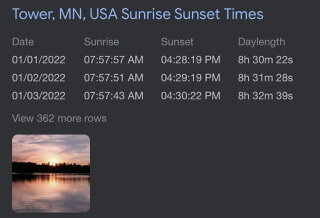My brother in law was born and raised in Tower Mn. He told me the sun rises at 9am and sets at 330 pm during theThe 2 year trial of permanent DST ended in 1974 because the winter morning sunrises were so late. Detroit had a bunch of problems, mostly traffic accidents and kids being in the dark to start school.
I'm thinking this will be another case of 'sounds great' turning into 'nope, go back'.
Might work in fair weather states, but we get more freezing rain here that melts by morning rush, but won't with DST because the sun won't have that extra hour to heat up.
What about just going back to standard time permanently?
shortest days of winter. Who wants a 10am sunrise? I don't


